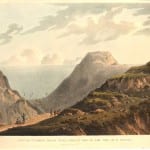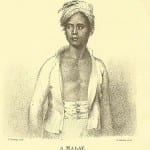By Ellen Filor
Please note that this case study was first published on blogs.ucl.ac.uk/eicah in August 2014. It was last checked by the project team on 19 August 2014. For citation advice, visit ‘Using the website’.
Alexander Hall was the youngest son of James Hall, 2nd Baronet of Dunglass (d. 1742). Little is known of his early life. He was born c. 1731-1732. Hall entered the East India Company in 1750 and was appointed factor to Fort Marlborough at Sumatra. He is interesting due to the survival of a large number of his familial letters and the way that he constructed a sense of ‘Scottishness’. Further, Hall’s biography offers insight into how material goods, often quotidian, structured imperial service economically and emotionally. These ‘things’ included enslaved and colonised persons. His life, moreover, offers a more personal, intimate account of life in Sumatra than previous over-arching histories of East India Company involvement with the island afford.[1]
This section examines the patronage and familial networks that secured Alexander Hall’s position as a factor in Sumatra. I then trace Hall’s journey to Sumatra, via the island of St Helena.
Alexander Hall’s account of Sumatra’s climate, natural resources and the indigenous population illuminates how he perceived the foreign country and sought to extract a fortune from the island.
Hall as Prisoner of War and His Great Escape
In 1760 Hall was taken prisoner by French naval commander Count D’Estaing. This section traces Hall’s attempt to be released from his parole, incorporating uncooperative Dutch Governors at Padang, a shipwreck off Nellore, and a journey back to London to petition the Directors of the East India Company.
Tinned Salmon and the Caledonian Mercury: Importing Scotland to Sumatra
Throughout his time in Sumatra, Alexander Hall maintained his connections to Scotland in multifarious ways: through letters, importing Scottish food and his reading material.
Sex and Slaves in Sumatra and Scotland
After his death, Hall’s sister had his mixed-race daughter sent to Scotland with a ‘black slave’ named ‘Betty’. In this section, I explore this ‘black presence’ in rural Scotland, laying bare the racialised violence that colonisation engendered.
Acknowledgements
Thanks to my occasional research assistant Viccy Coltman and Lucy Dow for her help deciphering Hall’s eating habits.
[1] A. G. Harfield, Bencoolen: A History of the Honourable East India Company’s Garrison on the West Coast of Sumatra, 1685-1825 (Barton-on-Sea, 1995); Robert J. Young, The English East India Company and Trade on the West Coast of Sumatra, 1730-1760, unpublished PhD thesis, University of Pennsylvania, 1970.




